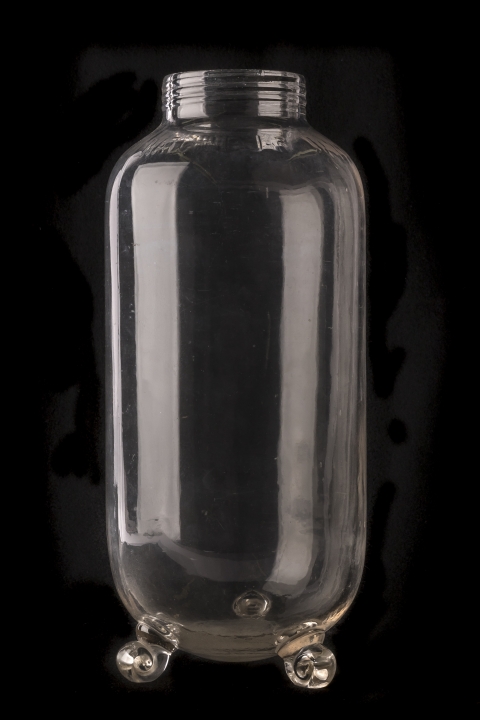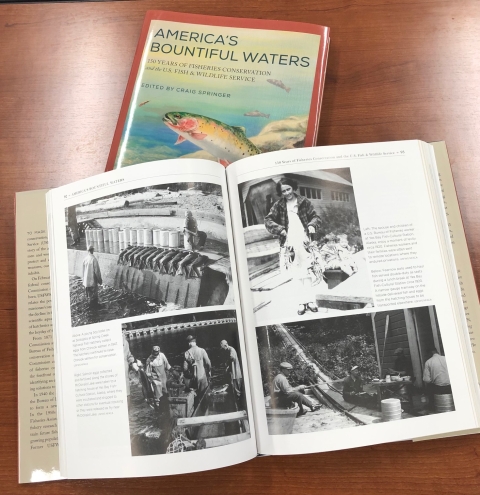What We Do
Preserving Fisheries History
Fish stocking records. Water testing kits. Historic photos. Scientific fisheries research papers. These are just a few examples of items that are housed in the U.S. Fish & Wildlife Service’s National Fish & Aquatic Conservation Archives (NFACA). Located on the grounds of the D.C. Booth Historic National Fish Hatchery, the archives are vast in size and contain priceless information on the history and management of our nations fisheries. Items date as far back as 1871, the year the U.S. Commission of Fish & Fisheries was established, which evolved into today’s U.S. Fish & Wildlife Service (FWS). The collection is not stagnant and continues to grow. There are items from every state in our nation, as well as several foreign countries. Our main focus is FWS fish and aquatic work and associated objects, but we also have things from other FWS programs, private and state hatcheries as well as multiple fisheries organizations such as the American Fisheries Society.
Everything is stored in temperature and humidity controlled environments, meeting industry standards. Each year, researchers from around the country contact the NFACA for more information on fisheries work, proving that the archives are a viable and important resource to many.
While the archives are available for tours by appointment only, everything on display in the Von Bayer Museum of Fish Culture is from the collection, as well as items in the historic superintendent’s house and fish rail car, and are seen by thousands of visitors annually.
Our Services
Research: Limited space and staff affect NFACA's ability to accommodate researchers, so NFACA generally cannot conduct in-depth research for patrons other then pulling materials for their research and use. Exceptions may be made for agency research requests. Access to materials is dependent upon their physical condition and level of processing to date by staff and volunteers. If you would like to inquire about researching the collection or set up a research appointment, please email the archives staff.
Tours: Tours of the archives are available by making an appointment with the curator. A sampling of the collection is on display next door in the National Fish Culture Museum which is open mid-May through September.
Can I donate to the archives?
If you are interested in donating an object to the museum collection, please send an email to the the archives staff. In your email, please include whatever background information you have about your object or archival material, with images, if possible. The information you provide will help the curator make a final decision and will increase the research value if the item(s) are accepted into the collections.
Our Projects and Research
National Fish & Aquatic Conservation Archives Presents: 150th Fisheries Anniversary Book
Staff and resources from the National Fish & Aquatic Conservation Archives (NFACA) played a key role in the recent production (2021) of a book titled America’s Bountiful Waters: 150 Years of Fisheries Conservation and the U.S. Fish & Wildlife Service. The publication highlights and celebrates our nation’s oldest federal conservation agency – the fisheries arm of the U.S. Fish & Wildlife Service.
NFACA staff, Director Carlos Martinez and Curator April Gregory, were core members of the book team that spearheaded the product. They spent well over a year researching historical information about the agency's fisheries work and scanning scads of historical photos for inclusion in the book. They also contributed a number of written pieces while working with editor Craig Springer who spent several months in-person at NFACA. America’s Bountiful Waters is available at major retailers such as Barnes and Noble and online.
Of course, the book only scratches the surface of the 150 year history of the U.S. Fish Commission, U.S. Bureau of Fisheries, and U.S. Fish & Wildlife Service’s Fish & Aquatic Conservation program. With more than 1.8 million archival records and growing, there remains many more fisheries subjects and stories for future researchers to discover at NFACA.




